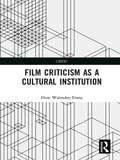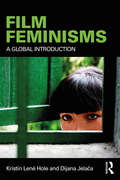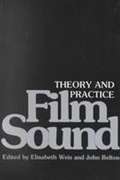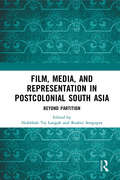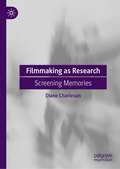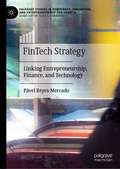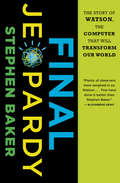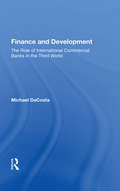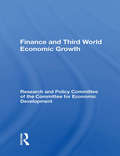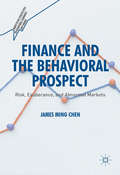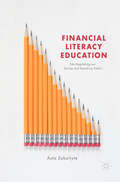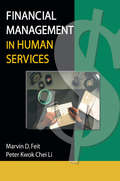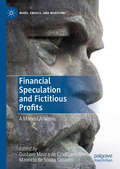- Table View
- List View
Film Criticism as a Cultural Institution: Crisis And Continuity From The 20th To The 21st Century (CRESC)
by Huw Walmsley-EvansAt the beginning of the 21st century film criticism was described as in crisis. The decline of print journalism, a series of lay-offs of prominent critics, and the rise of "amateur" reviewing online spurred a conversation about the decline, even death, of film criticism. This discourse flourished in part because film criticism has been little examined in scholarship to date. This book takes a deeper look at film criticism by focusing on its institutional contours. This is achieved through a combination of archival research and interviews with prominent film critics and stakeholders, including Adrian Martin (LOLA), Stephanie Zacharek (Time), Peter Bart (Variety), and Andrew Sarris (The Village Voice). Film Criticism as a Cultural Institution first examines the contemporary crisis conversation surrounding film criticism, comparing this to historical precedents. It then provides what today’s crisis conversation does not: an account of film criticism’s institutional formations. Using primarily U.S. and Australian case studies based on interviews, observation and archival research—as well as accounts from other national schools—the book maps contemporary film criticism. Across various sites, such as publications or online spaces, and organisations, such as film critics circles, it elucidates film criticism’s institutional practices, tasks, comportments, and personae. Looking at the history of conversations about film criticism shows us that "crisis" has always been a leitmotif. While acknowledging the considerable changes and challenges that film criticism faces today, this book situates these within an historical context and proposes an institutional framework that allows us to move beyond crisis discourse. Looking at film criticism in this way allows us to see that the very question of what counts as film criticism is continually contested within an institutional ecology made up of distinctive critical comportments addressed to distinctive audiences.
Film Feminisms: A Global Introduction
by Dijana Jelača Kristin Lené Hole<p>Film Feminisms offers a global and updated overview of the history, present-day concerns, and future of feminist film and theory. It introduces frameworks from phenomenology, affect theory, and psychoanalysis to reception studies, new media theories, and critical historiography, as well as engaging with key issues in documentary ethics, genre theory, and star studies. <p>This new textbook situates feminist film theory within the larger framework of transnational scholarly approaches, as well as decolonial, queer, disability studies, and critical race theories. It offers a much-needed update on pedagogical approaches to feminist film studies, providing discussions of filmmakers and films that have been overlooked in the field, or that are overdue for further analysis. <p>Each chapter is supported by a variety of pedagogical features including activities, key terms, and case studies. Many of the activities draw on contemporary digital media, such as social media and streaming platforms, to update the field to today's changing media landscape.</p>
Film Noir and the Spaces of Modernity
by Edward DimendbergFilm noir remains one of the most enduring legacies of 1940s and '50s Hollywood. Populated by double-crossing, unsavory characters, this pioneering film style explored a shadow side of American life during a period of tremendous prosperity and optimism. Edward Dimendberg compellingly demonstrates how film noir is preoccupied with modernity--particularly the urban landscape. The originality of Dimendberg's approach lies in his examining these films in tandem with historical developments in architecture, city planning, and modern communications systems. He confirms that noir is not simply a reflection of modernity but a virtual continuation of the spaces of the metropolis. He convincingly shows that Hollywood's dark thrillers of the postwar decades were determined by the same forces that shaped the city itself. Exploring classic examples of film noir such as The Asphalt Jungle, Double Indemnity, Kiss Me Deadly, and The Naked City alongside many lesser-known works, Dimendberg masterfully interweaves film history and urban history while perceptively analyzing works by Raymond Chandler, Edward Hopper, Siegfried Kracauer, and Henri Lefebvre. A bold intervention in cultural studies and a major contribution to film history, Film Noir and the Spaces of Modernity will provoke debate by cinema scholars, urban historians, and students of modern culture--and will captivate admirers of a vital period in American cinema.
Film Sound: Theory and Practice
by Elisabeth Weis John Belton B. WeissThis classic anthology provides essential models for analyzing sound stylistics through the detailed study of critical sound films. Elisabeth Weis and John Belton carefully curate major essays from the world's most respected film historians, aestheticians, and theorists, including Douglas Gomery, Barry Salt, Rick Altman, Mary Ann Doane, S. M. Eisenstein, V. I. Pudovkin, René Clair, Béla Belázs, Siegfried Kracauer, Christian Metz, David Bordwell, Kristin Thompson, Noël Burch, and Arthur Knight. Their selections recount the innovations and triumphs of Ernst Lubitsch, Fritz Lang, Orson Welles, Alfred Hitchcock, Rouben Mamoulian, Dziga Vertov, Robert Bresson, Jean-Luc Godard, Robert Altman, and Francis Ford Coppola, among many others, and explicate the techniques and practices of sound filmmaking from initial recordings to final theater playback. Film Sound is the ideal companion for anyone seeking both a comprehensive introduction to the form and a rich survey of its historical and global evolution.
Film als Kunst der Gesellschaft: Ästhetische Innovationen und gesellschaftliche Verhältnisse (Film und Bewegtbild in Kultur und Gesellschaft)
by Lutz Hieber Rainer WinterDer Band beschäftigt sich mit dem Kunstbegriff im Hinblick auf Film, wobei es sowohl um ästhetische Theorie als auch um konkrete Werke geht. Das Spektrum umfasst Spielfilme und Dokumentarfilme. Dabei liegt der Schwerpunkt auf den ästhetischen Innovationen des Mediums im Laufe seiner Geschichte und in der Gegenwart. Die Entwicklung visueller Ideen wird auf den historischen und gesellschaftlichen Kontext ihrer Entstehung und Rezeption bezogen. In den Blick geraten Filmautoren, Filmkünstler und Filmbewegungen, die nicht nur im Independent-Film, sondern auch im Mainstream zu finden sind.
Film and the Afterlife (Routledge Studies in Religion and Film)
by David RankinThis book explores how post-death existence is represented in popular film, looking at issues such as continuity, personal identity, and the nature of existence beyond the grave. Film often returns to the theme of dying, death and the afterlife, both directly and indirectly, because there are very few subjects as compelling and universal. The book compares the representation of death, dying and the afterlife in films to scholarly surveys of attitudes towards life-after-death through the analysis of twenty films made between the end of World War II and now. It looks at the portrayals of stages between death and a final destination; spatio-temporal and personal continuity; the nature of afterlife existence in terms of embodiment, or not; and the contact between the worlds of the living and the dead. This book offers a wide-ranging view on a compelling subject in film. As such, it will be of great interest to scholars of Religion and Film, Religion and Media, the Philosophy of Religion, and the Sociology of Religion, as well as Religion, Media and Film Studies more generally .
Film, Media and Representation in Postcolonial South Asia: Beyond Partition
by Nukhbah Taj LangahThis volume brings together new studies and interdisciplinary research on the changing mediascapes in South Asia. Focusing on India, Pakistan, and Bangladesh, it explores the transformations in the sphere of cinema, television, performing arts, visual cultures, cyber space and digital media, beyond the traumas of the partitions of 1947 and 1971. Through wide-ranging essays on soft power, performance, film, and television; art and visual culture; and cyber space, social media, and digital texts, the book bridges the gap in the study of the postcolonial and post-Partition developments to reimagine South Asia through a critical understanding of popular culture and media. The volume includes scholars and practitioners from the subcontinent to foster dialogue across the borders, and presents diverse and in-depth studies on film, media and representation in the region. This book will be useful to scholars and researchers of media and film studies, postcolonial studies, visual cultures, political studies, partition history, cultural studies, mass media, popular culture, history, sociology and South Asian studies, as well as to media practitioners, journalists, writers, and activists.
Filming in European Cities: The Labor of Location
by Ipek A. Celik RappasFilming in European Cities explores the effort behind creating screen production locations. Ipek A. Celik Rappas accounts the rising demand for original and affordable locations for screen projects due to the growth of streaming platforms. As a result, screen professionals are repeatedly tasked with chores such as transforming a former factory in Istanbul to resemble a war zone in Aleppo, or finding a London street that evokes Barcelona. Celik Rappas highlights the pivotal role crew members play in transforming cities and locations into functional screen settings. Examining five European media capitals—Athens, Belfast, Berlin, Istanbul, and Paris—the book delves into the overlooked aspects of location-related screen labor and its ability to generate production value. Filming in European Cities demonstrates that in its perpetual quest for authentic filming locations, the screen industry extracts value from cities and neighborhoods, their marginalized residents, and screen labor, enriching itself through this triple exploitation.
Filmmaking as Research: Screening Memories
by Diane CharlesonThis book examines the challenges often experienced by film practitioners who find themselves researching within the academy, either as students or academics. In light of this the author presents her own journey from practitioner to researcher as a lens. Her practice- based research has been a quest to ”revision” memories, by creating filmic images that elicit memory and remembering. In so doing she has used a range of platforms: multi- screen video installation, still- framing the moving image and remixing found footage. Central to this research has been the importance of family storytelling and sharing, the relationship of the visual and memory, the agency of nostalgia and the role of aura, particularly evident in the re-appropriating of super 8 home movies into a variety of forms. Important to this is has been the relationship of the viewer and the viewed in particular the role of an immersive environment of viewing.
Filmurbia
by Jonathan Rayner David Forrest Graeme HarperIn this book, scholars from across the world explore the appearance, portrayal and significance of the suburb on film. By the mid-20th Century, supported by changes in transportation, suburbs became the primary location of entire national populations and films about the suburbs began to concertedly reflect those suburbs' significance as well as their increasingly lively cultures! Suburbia very soon became filmurbia, as films of the suburbs and those made in the suburbs reflected both the positive and the negative aspects of burgeoning suburban life. Film-makers explored the existences of new suburbanites, their interests, their newly emerging neighbourhood practices, their foibles, their fantasies and their hopes. Whether depicting love, ambition, commerce, family, home or horror, whether traveling to or living in suburban spaces, whether exhibiting beauty, brazenness or brutality, the films of suburbia capture human life in all its diverse guises.
Filtered: Coffee, the Café and the 21st-Century City
by Emma FeltonCafé culture is flourishing in cities across the world. From London to Seoul, Melbourne to Shanghai and many cities in between, people are flocking to cafés. A recent phenomenon, café culture has made its reappearance only since the end of the 20th century. What is the appeal of the café for urban dwellers? And why now? ‘Having a coffee’ might be a daily ritual, yet it is more than coffee that draws us to the café. Cafés are vital social spaces, technically connected workspaces, and businesses that are forging design and food trends. The café is the lens through which this book explores major changes occurring in everyday life in cities across the world. Urban regeneration has fuelled the growth of urban amenity and social consumer spaces. The impact of technology, social and workplace transformation, and the ascendency of the design and food industries all find expression in the spaces of the cafe. The specialty coffee movement is a thriving, global presence, uniting café staff and customers across geographical borders, with a shared commitment to the connoisseurship of coffee. In the book’s global sweep, it examines the development of café culture in China, Japan and Australia as significant and interesting departures from traditional European café culture. Australia is a world leader and successful exporter of its unique style of coffee and food. Interviews with café patrons and staff illuminate why the café has become a meaningful place for many people in the 21st-century city.
FinTech Strategy: Linking Entrepreneurship, Finance, and Technology (Palgrave Studies in Democracy, Innovation, and Entrepreneurship for Growth)
by Pável Reyes-MercadoThis book explores how new and small ventures with comparatively fewer financial resources have been able to compete with big banks and financial institutions. It discusses entry, competition, and growth strategies based on new business models enacted by current FinTech ventures. An analysis of strategies for Fintech and of cases from banked as well as non-banked and underbanked customer segments produces a framework based on effectuation, resulting in a final discussion of the broad societal outcomes of FinTech related to financial inclusion, the digital divide, and the UN’s Sustainable Development Goals. This book, linking theory with practical application, offers scholars a comprehensive strategic view on FinTech from effectual, causal, and entrepreneurial innovation standpoints.
Final Jeopardy: The Story of Watson, the Computer That Will Transform Our World
by Stephen BakerThe &“charming and terrifying&” story of IBM&’s breakthrough in artificial intelligence, from the Business Week technology writer and author of The Numerati (Publishers Weekly, starred review). For centuries, people have dreamed of creating a machine that thinks like a human. Scientists have made progress: computers can now beat chess grandmasters and help prevent terrorist attacks. Yet we still await a machine that exhibits the rich complexity of human thought—one that doesn&’t just crunch numbers, or take us to a relevant web page, but understands and communicates with us. With the creation of Watson, IBM&’s Jeopardy!-playing computer, we are one step closer to that goal. In Final Jeopardy, Stephen Baker traces the arc of Watson&’s &“life,&” from its birth in the IBM labs to its big night on the podium. We meet Hollywood moguls and Jeopardy! masters, genius computer programmers and ambitious scientists, including Watson&’s eccentric creator, David Ferrucci. We see how Watson&’s breakthroughs and the future of artificial intelligence could transform medicine, law, marketing, and even science itself, as machines process huge amounts of data at lightning speed, answer our questions, and possibly come up with new hypotheses. As fast and fun as the game itself, Final Jeopardy shows how smart machines will fit into our world—and how they&’ll disrupt it. &“The place to go if you&’re really interested in this version of the quest for creating Artificial Intelligence.&” —The Seattle Times &“Like Tracy Kidder&’s Soul of a New Machine, Baker&’s book finds us at the dawn of a singularity. It&’s an excellent case study, and does good double duty as a Philip K. Dick scenario, too.&” —Kirkus Reviews &“Like a cross between Born Yesterday and 2001: A Space Odyssey, Baker&’s narrative is both . . . an entertaining romp through the field of artificial intelligence—and a sobering glimpse of things to come.&” —Publishers Weekly, starred review
Finance And Development: The Role Of International Commercial Banks In The Third World
by Michael DaCostaAlthough commercial banks have played an increasingly important role in providing capital to developing nations, many analysts argue that private financing poses risks both to borrowing nations and the stability of the international economic system. In response, Mr. DaCosta demonstrates that developing nations that adopt appropriate policies can gain substantially by drawing on private sources of capital. His analysis indicates that many criticisms of the role of commercial banks are unfounded and that debt problems in LDCs typically are related to inadequate reserve and external debt management policies in the borrowing countries themselves. Emphasizing that economic growth in LDCs often is constrained by balance-of-payment deficits, Mr. DaCosta shows that nations relying on private capital frequently experience higher-than-average growth rates and argues that the advantages of unconditional or untied aid generally outweigh the constraints imposed by the multilateral aid agencies. In conclusion, he outlines specific policies developing nations can adopt to reduce financial risk and, turning to the needs of the poorest of the LDCs, examines a variety of proposals aimed at increasing the flow of concessional assistance to those countries that cannot qualify for commercial bank funds.
Finance And Third World Economic Growth
by John Edwards"I would like to thank the business and education leaders who served on the CED Subcommittee on Finance and Third World Economic Growth for their diligent work and practical contributions. In particular I would like to thank Subcommittee Chairman James W. McKee, chairman of the executive committee of CPC International Inc., whose leadership, insight, and interest in these issues guided the subcommittee through to publication of the policy statement. I would also like to acknowledge the outstanding work of Professor Isaiah Frank of the School of Advanced International Studies at Johns Hopkins University, who served as project director. His knowledge in this field and expertise in drafting the statement clarified many complex issues. Thanks also go to Research Assistant Patricia Pollard of Johns Hopkins University, who was of valuable assistance to Dr. Frank in compiling the necessary research. William "
Finance and the Behavioral Prospect
by James Ming ChenThis book explains how investor behavior, from mental accounting to the combustible interplay of hope and fear, affects financial economics. The transformation of portfolio theory begins with the identification of anomalies. Gaps in perception and behavioral departures from rationality spur momentum, irrational exuberance, and speculative bubbles. Behavioral accounting undermines the rational premises of mathematical finance. Assets and portfolios are imbued with “affect.” Positive and negative emotions warp investment decisions. Whether hedging against intertemporal changes in their ability to bear risk or climbing a psychological hierarchy of needs, investors arrange their portfolios and financial affairs according to emotions and perceptions. Risk aversion and life-cycle theories of consumption provide possible solutions to the equity premium puzzle, an iconic financial mystery. Prospect theory has questioned the cogency of the efficient capital markets hypothesis. Behavioral portfolio theory arises from a psychological account of security, potential, and aspiration.
Finance for Sport and Leisure Managers: An Introduction
by Robert Wilson John JoyceSport and leisure managers need to understand the financial side of their industry to offer the most cost-effective facilities and to make sound business decisions. However, to the non-expert the language and practice of finance is often bewildering and perceived as complicated, difficult and impenetrable. This textbook guides the reader throu
Financial Counseling
by Dorothy B. Durband Ryan H. Law Angela K. Mazzolini"This text is a valuable new resource that we recommend for all of our professionals and are proud to incorporate as part of our AFC® certification program. With expertise representing the breadth and depth of the financial counseling profession, the content in this text provides you with a rigorous foundation of knowledge, considers critical theoretical models, and explores foundational skills of communication, self-awareness, and bias. This type of comprehensive approach aligns with our mission and vision—providing you with the foundational knowledge to meet clients where they are across the financial life-cycle and impact long-term financial capability." -Rebecca Wiggins, Executive Director, AFCPE® (Association for Financial Counseling and Planning Education®)This timely volume presents a comprehensive overview of financial counseling skills in accessible, practical detail for readers throughout the career span. Expert financial counselors, educators, and researchers refer to classic and current theories for up-to-date instruction on building long-term client competence, working with clients of diverse backgrounds, addressing problem financial behavior, and approaching sensitive topics. From these core components, readers have a choice of integrated frameworks for guiding clients in critical areas of financial decision-making. This essential work: · Offers an introduction to financial counseling as a practice and profession · Discusses the challenges of working in financial counseling · Explores the elements of the client/counselor relationship · Compares delivery systems and practice models · Features effective tools and resources used in financial counseling · Encourages counselor ethics, preparedness, and self-awareness A standout in professional development references, Financial Counseling equips students and new professionals to better understand this demanding field, and offers seasoned veterans a robust refresher course in current best practices.
Financial Crime in Romania: A Community Pulse Survey (SpringerBriefs in Finance)
by Monica Violeta Achim Robert W. McGeeThis book explores financial crime and corruption in Romanian society based on a community pulse study. It examines the main behavioral patterns of Romanian society in relation to financial crime variables such as tax compliance, tax morale, corruption in public institutions, and money laundering. The authors also investigate how various demographic aspects (e.g., age, gender, region, professional status, education, etc.) are associated with financial crime. The results of the enclosed survey help policy makers consider best practices in financial governance to reduce the level of financial crime in the region.
Financial Crisis, Labour Markets and Institutions (Routledge Frontiers of Political Economy #170)
by Pasquale Tridico Sebastiano FaddaThis book seeks to explain the global financial crisis and its wider economic, political, and social repercussions, arguing that the 2007-9 meltdown was in fact a systemic crisis of the capitalist system. The volume makes these points through the exploration of several key questions: What kind of institutional political economy is appropriate to explain crisis periods and failures of crisis-management? Are different varieties of capitalism more or less crisis-prone, and can the global financial crisis can be attributed to one variety more than others? What is the interaction between the labour market and the financialization process? The book argues that each variety of capitalism has its own specific crisis tendencies, and that the uneven global character of the crisis is related to the current forms of integration of the world market. More specifically, the 2007-09 economic crisis is rooted in the uneven income distribution and inequality caused by the current financial-led model of growth. The book explains how the introduction of more flexibility in the labour markets and financial deregulation affected everything from wages to job security to trade union influence. Uneven income distribution and inequality weakened aggregate demand and brought about structural deficiencies in aggregate demand and supply. It is argued that the process of financialization has profoundly changed how capitalist economies operate. The volume posits that financial globalization has given rise to growing international imbalances, which have allowed two growth models to emerge: a debt-led consumption growth model and an export-led growth model. Both should be understood as reactions to the lack of effective demand due to the polarization of income distribution.
Financial Literacy Education
by Asta ZokaityteThis book explores the issue of consumer financial education, responding to increased interest in, and calls to improve peoples' financial literacy skills and abilities to understand and manage their money. New conceptual frameworks introduced in the book offer academic audiences an innovative way of thinking about the project on financial literacy education. Using the concepts of 'edu-regulation' and 'financial knowledge democratisation' to analyse the financial education project in the UK, the book exposes serious, and often ignored, limitations to using information and education as tools for consumer protection. It challenges the mainstream representation of financial literacy education as a viable solution to consumer financial exclusion and poverty. Instead, it argues that the project on financial literacy education fails to acknowledge important dependences between consumer financial behaviour and the socio-economic, political, and cultural context within which consumers live. Finally, it reveals how these international and national calls for ever greater financial education oversimplify and underestimate the complexity of consumer financial decision-making in our modern times.
Financial Management in Human Services
by Marvin D Feit Peter K LiRather than treating financial management as an independent administrative practice, Financial Management in Human Services provides students and social service administrators with a conceptual framework in which financial management is the major responsibility of an administration, not just a separate practice. This text describes how the integration of administrative practice with fiscal responsibility and accountability will help you plan better programs, account for all fiscal transactions, and coordinate and evaluate services more effectively.Containing many different approaches on how to determine costs, obtain information, and collect data, this text will help you clearly evaluate your organization’s progress and determine if your program goals are being reached. Financial Management in Human Services also discusses other topics related to efficient management, including: applying financial management techniques to the areas of program planning, service monitoring, estimating service and unit costs, and setting future service priorities in order to make better business decisions utilizing the information generated from the Financial Management System (FMS) to improve administrative functions, such as forecasting and goal determination, activity flow and service provision monitoring, and service planning according to program policy examining the importance of the four administrative subsystems-- budgeting and accounting, service coordination, program planning, and program evaluation choosing a FMS with consideration to certain factors, such as availability of information and identifying informational needs of the administration listing of reactive and proactive types of financial reports that help administrators evaluate the costs of services provided and identify problems in balancing the fiscal budget using methods such as a line item analysis to accurately compute the costs of staff involvement in a programThis organized, straightforward text will help you evaluate all costs-- from salaries, travel time, and office supplies to direct costs to make your office more organized and productive. Complete with questions and answers about starting and maintaining a FMS, Financial Management in Human Services will enable you to manage finances more efficiently, making it easier for you to reach and set goals that better serve your clients.
Financial Security and Personal Wealth
by Lewis D. SolomonAmerica's elderly population is soaring, presenting numerous challenges for policymakers in the United States. Other developed nations with aging populations face similar problems. There will be fewer workers relative to retirees in coming decades and the elderly are also expected to live longer. The impact of these demographic changes in the United States is likely to be challenging, especially for America's system of social security. Solomon offers new perspectives on how to meet the future costs of social security without bankrupting the next generation or gravely damaging the U.S. economy. He also shows, more broadly, how to provide for the financial security of America's senior populations.Over the past two decades, primary responsibility for providing a financially adequate retirement has shifted from the federal government and employers to individuals. For most Americans, social security alone will not provide enough income. Most companies have shed their pension plans for 401(k) plans, to which companies and employees contribute, and in which participants must make their own investment decisions. Consequently, achieving financial security in retirement has increasingly become one's personal responsibility.Solomon deals extensively with the politics of social security, past and present. He examines the presidential leadership of Franklin D. Roosevelt and Ronald Reagan, both of whom revived the nation's spirit in times of crisis, both of whom introduced economic policies that remain controversial to the present day. He also considers in detail contemporary efforts to rethink social security, focusing on fundamental reform of the social security system and the expansion and simplification of employer-sponsored retirement plans and individual retirement arrangements.Richly textured, informed, and informative, Financial Security and Personal Wealth encompasses history, demography, political economy, public finance, social policy.
Financial Speculation and Fictitious Profits: A Marxist Analysis (Marx, Engels, and Marxisms)
by Gustavo Moura de Cavalcanti Mello Mauricio de Souza SabadiniThis book provides an original account of financialisation and outlines the creation of fictitious profits as a basis to describe the present phase of capitalist accumulation in the neoliberal era. Making innovative theoretical elaborations on Marx’s notion of fictitious capital, Financial Speculation and Fictitious Profits offers a dialectic analysis of the increasing financialization during this crisis-ridden period based on the original concepts of fictitious profit and fictitious wealth. Combining the most important research from over twenty years of scholarly inquiry with groundbreaking new studies, Financial Speculation and Fictitious Profits is more than a collection of texts by political economists on a contemporary topic; it is a synthesis of an intense process of academic production that began with work of Karl Marx and has resulted in the formulation of a differentiated interpretative perspective on the contemporary evolution of capitalist crisis.
Financialization as Welfare: Social Impact Investing And British Social Policy, 1997-2016
by Philipp GolkaProviding an in-depth case study on the emergence of social impact investing in the UK, this book develops a new perspective on financialization processes that highlights the roles of non-financial actors. In contrast to the common view that impact investing gears finance toward the solution of social problems, the author analyzes how these investments create new problems and inequalities. To explain how social impact investing became popular in British social policy despite its unclear effectiveness, the author focuses on cooperative relations between institutional entrepreneurs from finance and various non-financial actors. Drawing on field theory, he shows how seemingly unrelated social transformations – such as HM Treasury's expanding role in public service reform – may act as resonance spaces for the spread of finance. Opening up a new perspective on financialization processes in the terrain of public policy, this book invites readers to refocus scholarship on capitalist dynamics to the meso-level. Based on this analysis, the author also proposes ways to transform social impact investing to increase its potential for reducing global inequalities.
